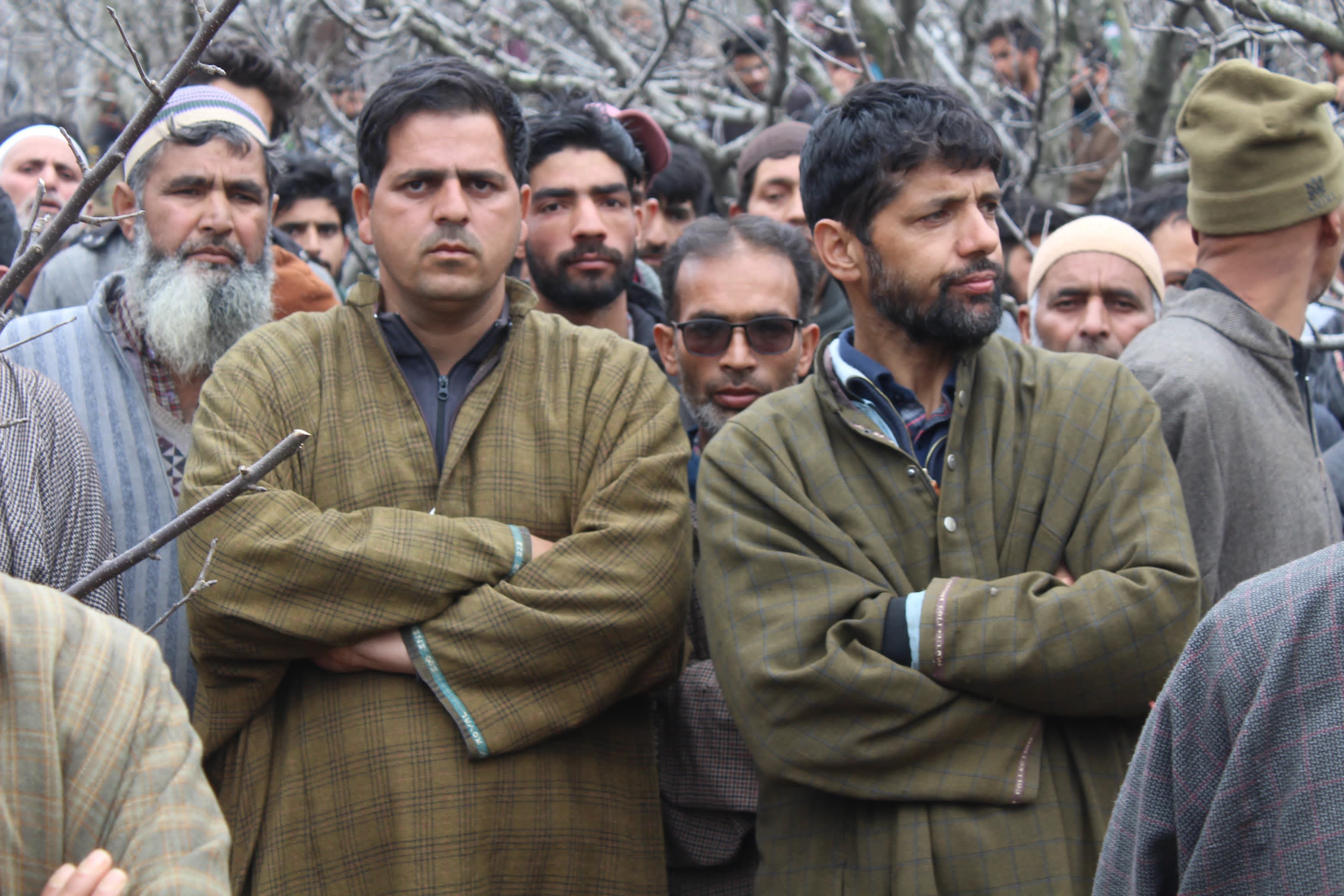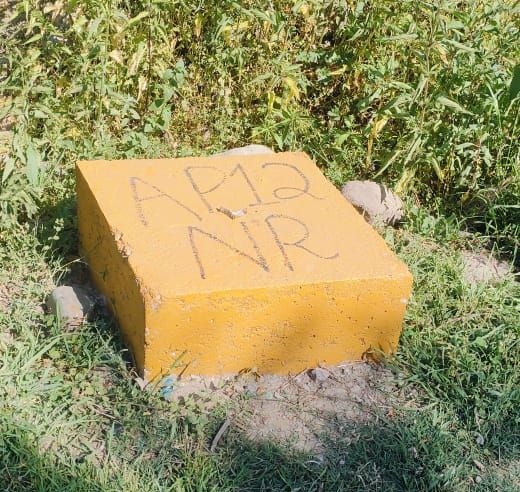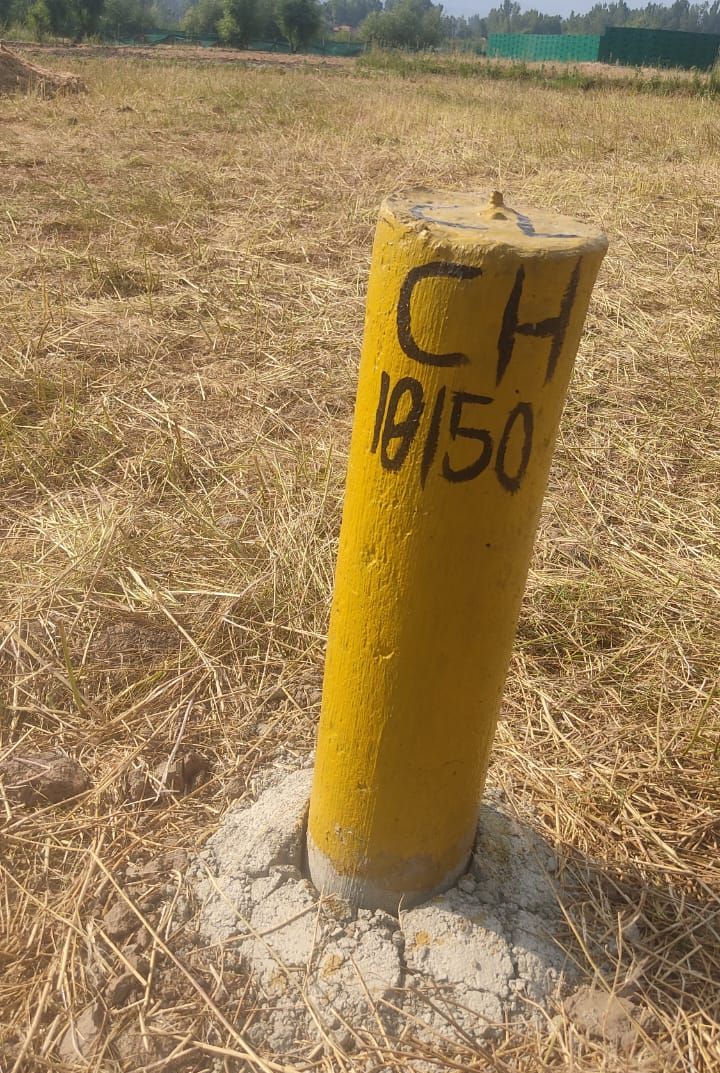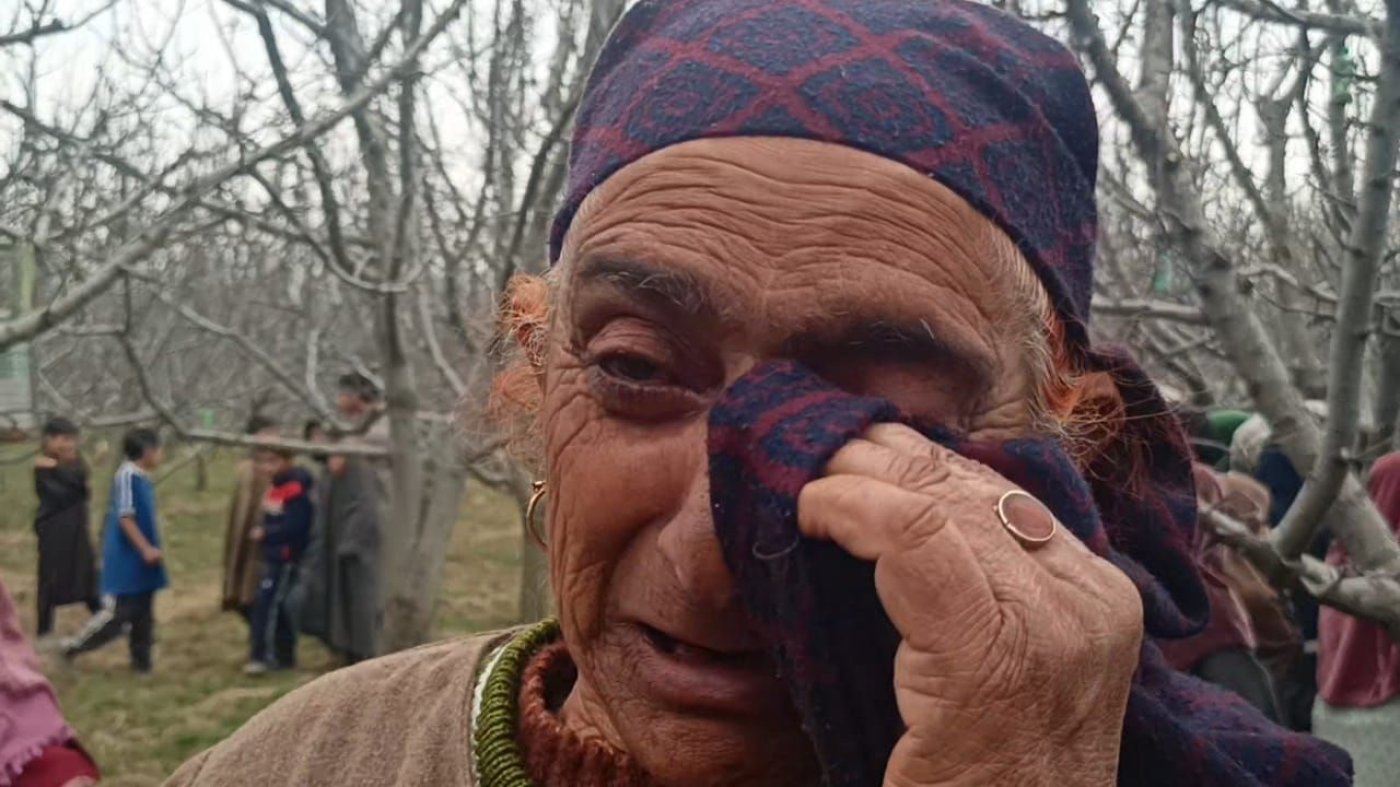ANANTNAG/SHOPIAN: On 4 March 2024, Muzafar Ahmad Malik, a 42-year-old apple grower from Shopian district in south Kashmir, was lying on a bed in the government district hospital, recovering from a heart condition and agonising about the government’s plan to build a railway line that would subsume his 10 kanal (one acre) orchard.
"It was not the fear of death that had brought my abuji to tears, but the impending death of our way of life, the lifeblood of our land," said Mehvish Muzafar, Malik’s daughter, recalling the incident a month later.
“For generations, our hands have worked these trees, and now they want to replace them with tracks. Our sweat and toil mean nothing to them,” she said. “Seeing orchards destroyed for tracks and roads feels like our lives are being destroyed too.”
Malik’s wife said the earnings from their apple orchard paid for his medication and the education of their four daughters.
“If the government proceeds with the rail line construction through our land, where will we go?” she said.
With 75% of India's apple production coming from Kashmir, the industry contributes 10% to Jammu and Kashmir’s gross domestic product and employs 3.5 million people, 23.35% of the population.
The union government led by the Bharatiya Janata Party (BJP) plans to enhance connectivity in the Kashmir valley by laying down 324.4 km of new railway track inside Anantnag, Kulgam, Shopian, and Pulwama in the south and Baramulla and Kupwara in the north.
The proposed rail network has become a source of worry and anxiety for apple growers in Kashmir, especially after officials started turning up to measure their land without prior notice or consultation. The loss of their orchards would not only disrupt their livelihood but their entire way of life.
Sections 4 and 11 of the Right to Fair Compensation and Transparency in Land Acquisition, Rehabilitation and Resettlement Act, 2013 mandate a formal public notice about the acquisition of public land, consultation with the village councils, and a social impact assessment.
Deputy commissioner of Shopian, Faz Lul Haseeb, and Bijbehara Nusrat Aziz, the tehsildar of Bijbehara tehsil in Anantnag, did not respond to Article 14’s questions about the alleged lack of notice and consultation.

Protests have occurred in parts of south Kashmir, including Baramulla in the north and Anantnag, Shopian, and Pulwama in the south.
The union railway ministry has said that the initiative of new railway lines would accelerate investment and generate more employment opportunities in the nation's largest Muslim-majority area.
“I believe railway connectivity is the lifeline of a society,” said Manoj Sinha, J&K’s lieutenant governor, on 6 August 2023. “A railway line not only strengthens connectivity with different regions but it also brings economic prosperity and transforms standard of living and creates a new destiny for the concerned region.”
On 20 December 2023, union railway minister Ashwani Vaishnav told Parliament that the final locations of five railway lines had been approved in the Kashmir division. These include the expansion of the existing Baramulla–Banihal section to a double line over a stretch of 135.5 km, and new lines from Baramulla–Uri (50 km), Sopore–Kupwara ( 33.7 km), Awantipora–Shopian (27.6 km), and Anantnag–Bijbehara–Pahalgam (77.5 km).
Zahoor Ahmad Bhat, the director of the horticulture department in Kashmir, told Article 14 that there would be no significant impact on overall apple production, as other areas in Kashmir were being converted into apple orchards and that any potential loss of apple trees could be compensated by planting double the number.
According to the horticulture department, J&K, the area under horticulture has increased from 82,486 hectares in 1975 to 3,44,653 hectares in 2024.
The area under apple production has increased from 46,189 hectares to 1,72,141 hectares in 2024, including 1,50,615 hectares in Kashmir and 19,526 hectares in the Jammu region.
From 2001 to 2023, apple production increased from 9,09,583 metric tonnes to 20,64,295 metric tonnes, an increase of nearly 127% in 22 years.
However, studies published in 2017 and 2019 have highlighted that compensatory afforestation is a contentious practice that often exacerbates environmental degradation rather than mitigating it. The practice is criticised for masking ongoing land grabs, encroaching upon community-held lands and common property resources, and "adding to environmental damage instead of mitigating or compensating it".
"Many of the firms involved are state-owned, yet are routinely allowed to violate statutory obligations, exposing the pitiful state of environmental compliance in India," said the study published by the World Rainforest Movement in 2019.
Senior Communist Party of India (Marxist)leader M Y Tarigami said that the proposed railway expansion in Kashmir must not come at the cost of destroying orchards and forests, and proceeding with the railway project without proper consultation with the affected communities was deeply concerning.
"We cannot afford to sacrifice our agricultural heritage for the sake of development," said Tarigami.

Land Over Compensation
No compensation has been announced yet, but villagers said they would not accept money in lieu of land.
"Even if they offer us money in abundance, we won't permit them to take our orchard,” said Hajira Bano, 60, who owns 18 kanals or (2.25 acres) of land in Reshipora village.
"We are unwilling to surrender, regardless of the cost,” said Hajira. “They're leaving us stranded after we've poured our lives into building our homes and nurturing our orchards.”
A mother of three children, Hafeeza Bano, 55, who owns 13 kanals (1.625 acres) of land in Bandina village in Pulwama district, said that it took half a century for an orchard to reach its full potential.
"Just like I've raised my three children, I've nurtured these trees,” said Hafeeza. “Do the authorities want our children to abandon the honourable profession of farming and pursue other jobs like driving?"
Small Land Holdings
During the 2010-2011 agriculture census, the average size of operational land holdings in India was 22.73 kanals (2.84 acres or 1.15 hectares), whereas in J&K, it was lower at 12.25 kanals (1.53 acres or 0.62 hectares.) Kashmir had even smaller landholding sizes than the state average. For instance, Anantnag and Kulgam had land holdings of 0.39 hectares each, while Srinagar had the smallest at 0.31 hectares.
According to a report published in 2021 by the National Bank for Agriculture and Rural Development: 85.9% of farmers in J&K are Small and marginal farmers. The size of small agricultural land holdings in the region was reported as 10.87 kanals (1.35 acres) during the agriculture census 2015-16, although other sources suggest they are even smaller, around 0.45 hectares or 1.11 acres, approximately 8.89 kanals.
Kashmiri environmentalist Raja Muzaffar said that Kashmiri residents would have been less affected if their land holdings were larger, similar to those in states like Madhya Pradesh, Maharashtra, Gujarat, or Rajasthan.
"In Kashmir valley, land holdings are typically small. Losing even half an acre (4 kanal) of apple farmland could be devastating,” said Muzaffar.

Expanding Network
The construction of railway lines in the Udhampur—Banihal section through Katra and Sangaldan in south Kashmir in the 2000s primarily involved the acquisition of forest land in rugged mountainous areas, sparing much of the agricultural land.
Conversely, the line from Qazigund in south Kashmir to Baramulla in the north, sanctioned in 1994-1995, required the acquisition of 90% agricultural land.
Despite this, the project was well-received as it was a pioneering venture in the Kashmir valley, leading to landowners being compensated and many securing employment with the railways.
The extension of the railway line from Qazigund to Banihal in the south from 2005 to 2012, which included an 11 km tunnel, did not necessitate significant acquisition of agricultural land.

‘They Can’t Measure The Pain’
Apple growers in Anantnag and Shopian said that government officials had marked land in approximately 20 villages without seeking the consent of the landowners.
"Government officials have come onto our land and marked our apple orchards for rail line construction without even asking us," said Tariq Ahmad, a 45-year-old apple grower from Wullarhama in Anantnag, 60 km from Reshipora village in Shopian.
Abdul Majeed, 48, said that around 20 kanals (2.5 acres) of his orchards in Dirhama village in Anantnag district, 10 km from Wullarhama village, had been marked without any prior consent.
"It's like they're trying to terrorise us, attacking our way of life. We've worked this land for generations, and now they want to take it away without even a word of consultation," said Majeed. "This isn't governance. It's a form of oppression.”
"It's like they're trying to erase our existence, wiping away years of hard work and dedication," he said. "They can measure our land, but they can't measure the pain and loss they're causing us.”
Majeed said the trees he had tended to for almost 25 years were generating an annual income of approximately Rs 15,00,000 rupees for the family.
With tears welling up in his eyes, Majeed said: "I've poured my sweat and soul into these trees. For half a century, this land has been my life, my everything. And now, when it's time to reap the rewards of my labour, they want to snatch it away.”
(Junaid Manzoor Dar is a Kashmir-based independent journalist who covers politics, environment, and education.)
Get exclusive access to new databases, expert analyses, weekly newsletters, book excerpts and new ideas on democracy, law and society in India. Subscribe to Article 14.

